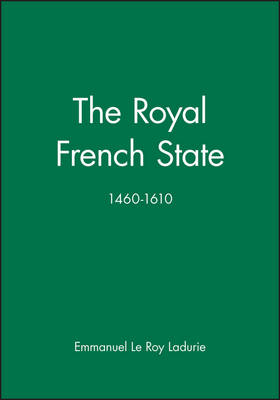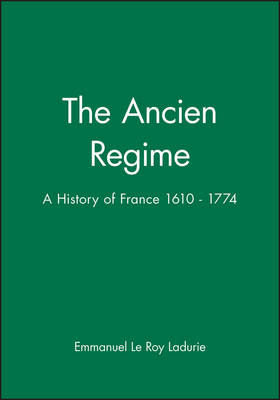History of France
2 total works
In this second volume of the History of France series, Emmanuel Le Roy Ladurie provides an account of the early modern period. Readers will discover a compelling narrative combined with a broad analysis of events and wider comparisons with European history.After the traumas of the Black Death and the Hundred Years War, relative social and economic stability provided a backdrop for the splendors of France's great Renaissance Prince, Francois I, and then for the tensions and bloodshed of later sixteenth-century France. The Wars of Religion were not simply a religious conflict between Catholics and Protestant Huguenots, but encapsulated other tensions - between, for example, decentralized, representative government and the much more autocratic monarchical government which ultimately prevailed. The period also saw the development of many features which became hallmarks of French government. Above all, the two poles of proto-absolutism and Huguenot theories of legitimate resistance carried with them the germs of much greater future conflict, which were eventually to culminate in the French Revolution.Extensively illustrated and containing helpful figures, this outstanding book will be of wide interest to specialists and general readers alike.
This is a story of brilliance, order and sophistication, of supreme confidence and great achievement - that begins in uncertainty and ends in iconoclasm. It is retold here by a great historian in a narrative in which broad interpretation is balanced and informed by a vivid evocation of incident and individual aspiration.With the death of Marie de Medici moderate, decadent monarchy died too, and Louis XIII's chief minister, Richelieu, inaugurated the age of absolutism. With unmatched calculation and ability he introduced system to the chaos of administration, cunningly manipulated the warring nations of Europe to the ends of France, and bequeathed to Mazarin and Louis XIV a state machine that was efficient, rational and, above all, funded. What Richelieu had achieved in the name of sovereignty, the new king swiftly concentrated in himself: conformity took precedence over service, style over loyalty, exhibition over economy. Tolerance born of pragmatism was dispelled in the persecution of the Huguenots and in needless feuds with the Protestant north. The arts flourished, but at the expense of the state.Absolutism under Louis XIV's successors, Philippe d'Orleans and Louis XV, showed itself once more capable of rational action.
The Protestants and the Jansenists were tolerated, and the economy thrived in the midst of an outpouring of knowledge, thought, writing, and art. The institutions of the state became once more aware of the needs of its citizens even if not always meeting them. But the sequence of repression and tolerance now proved (as so often) an explosive mixture. The rhetoric of liberty and democracy insisted that monarchy and aristocracy - whether enlightened or not - and with all their trappings of show and patronage must be purged. And thus the Ancien Regime ended: in the duplicity and weakness of Louis XVI and in the rapacious egalitarianism of the revolutionaries, a combination presaging a century of struggle, disorder, oppression, and war.
The Protestants and the Jansenists were tolerated, and the economy thrived in the midst of an outpouring of knowledge, thought, writing, and art. The institutions of the state became once more aware of the needs of its citizens even if not always meeting them. But the sequence of repression and tolerance now proved (as so often) an explosive mixture. The rhetoric of liberty and democracy insisted that monarchy and aristocracy - whether enlightened or not - and with all their trappings of show and patronage must be purged. And thus the Ancien Regime ended: in the duplicity and weakness of Louis XVI and in the rapacious egalitarianism of the revolutionaries, a combination presaging a century of struggle, disorder, oppression, and war.

